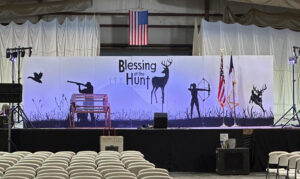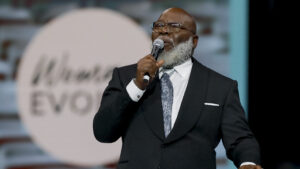
DENVER – “Everything rises and falls with relationships.” These words by Michael Proud Jr., common parlance among Southern Baptist leaders at the local church, associational, state and national levels, take on vivid clarity when applied to what’s taking place in the Colorado Baptist General Convention.
Proud, who grew up and pastored in Colorado, spent 10 years as director of missions for the Orange County Southern Baptist Association in Southern California. He returned to Colorado in December 2021 as the state convention’s executive director.
“If people get to know you, they’ll learn to trust you, and if they trust you, they’ll reach out when they need help, and they will partner with you,” Proud told Baptist Press. “I think all of us can resonate with that.”
With that belief and with the experience of ministering at the associational level, Proud led the state convention to completely revamp its organizational structure and strategy.
“I think there has been a discounting of the value of the local association ministry across the Southern Baptist Convention in the past, but what we’re learning in Colorado is the association is on the front line of ministry to the churches,” Proud said. “Our convention simply wants to partner with the associations to strengthen their ministry for our churches.”
He calls the new strategy a “collaboration.”
Hundreds of miles in the Centennial state
Proud spent much of his first four months as Colorado’s new executive director traveling the state, typically meeting with pastors in gatherings hosted by a local association.
“When I left here in 2005, there were 13 associations, and every association had a paid staff person,” Proud said. “Southern Baptists are about working together, yet when I came back in 2021, there were 11 associations and only one paid director of missions. Essentially there was not even part-time leadership intentionally focused on ministering to the churches.
“Over and over again I heard, ‘Back in the day, with an associational leader, we were able to do more things.’” Proud continued. “Most associations didn’t have a lot going on, and in many places the ground [to partnership] had hardened.”
In some cases, a pastor left the church or there was some other difficulty, but the state convention didn’t hear about it for a year after. The COVID-19 pandemic added to many pastors’ sense of isolation at a time connection was sorely needed.
Once back to the Baptist building in Denver, Proud discussed with the state convention staff the thinking he’d done driving hundreds of Colorado miles.
“What if,” he suggested, “we created a strategy where we partner with associations? Both agreeing to share the cost of hiring an individual. We could get someone on the field from that area, identified by them that we would agree to, and they would serve as part of state convention leadership team.
“The thought in that,” Proud explained, “was that if we’re going to create strategies for our churches – that is, for the field – we’d do well to be informed by the field. If we could find eight regional directors to cover 11 associations, that would be a win for Colorado Baptists.” (Some associations with smaller numbers of affiliated churches partner with other associations in geographical proximity.)
Two staff positions were vacant before Proud was hired, which he had waited to fill until he knew the needs of the state convention. That money enabled the state convention to partner with the associations.
‘An equal voice at the table’
By April 2022 – four months after Proud was called as the state convention’s leader – three regions had signed on, with men of their choice, respected pastors from the association, approved by the state convention, as full-time regional directors.
Mile High Baptist Association voted at its annual meeting this August to join the collaboration. Now, all but one of the state convention’s regions officially are part of Colorado’s new strategy, and the holdout is solely for lack of sufficient financial resources, Proud said. Each vote for participation was unanimous.
The three-person state convention staff and the regional directors meet together the first Monday and Tuesday of each month.
“They all have an equal voice at the table,” Proud said. “No one plays a trump card. I have no more authority or weight in decision-making than any of them. We are a room of peers. The beauty of this, as far as our churches are concerned, is that we are all on the same page, going in the same direction and on the same team. And that’s the way it’s supposed to be. …
“Rather than a convention of specialists we have a convention of generalists,” Proud said. “As these guys build relationships in the field, pastors reach out to them when they have a need, such as training for Sunday School teachers. If the regional director doesn’t have the needed expertise, he asks another regional director he knows who does have it and they share best practices.
“In this way. even though regional directors are assigned to a particular part of the state, each of them can benefit any church in the state. It truly is a collaborative partnership. Ultimately the strategy is how do we add value to the church? The best way to do that is to partner with the people closest to the church.”
Karen L. Willoughby is a national correspondent for Baptist Press.














